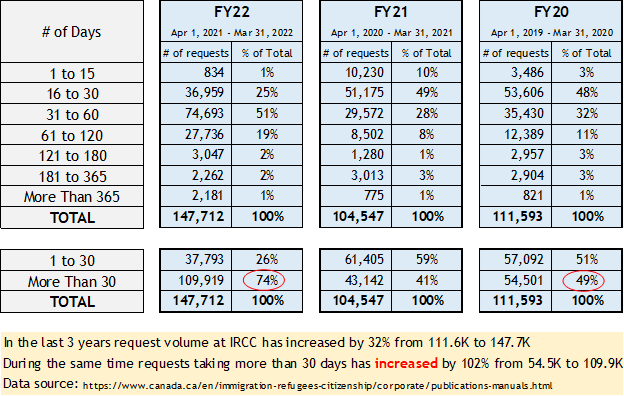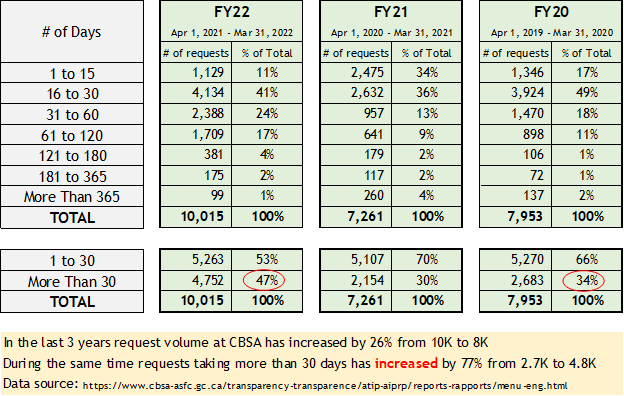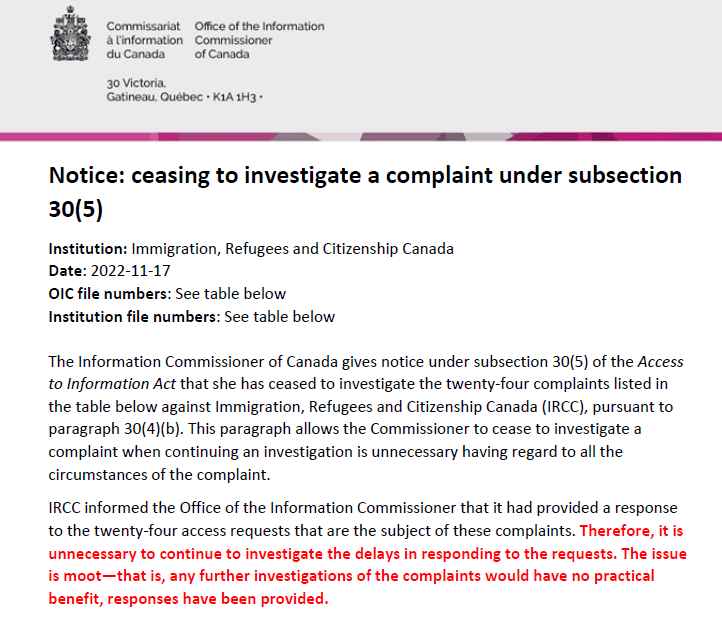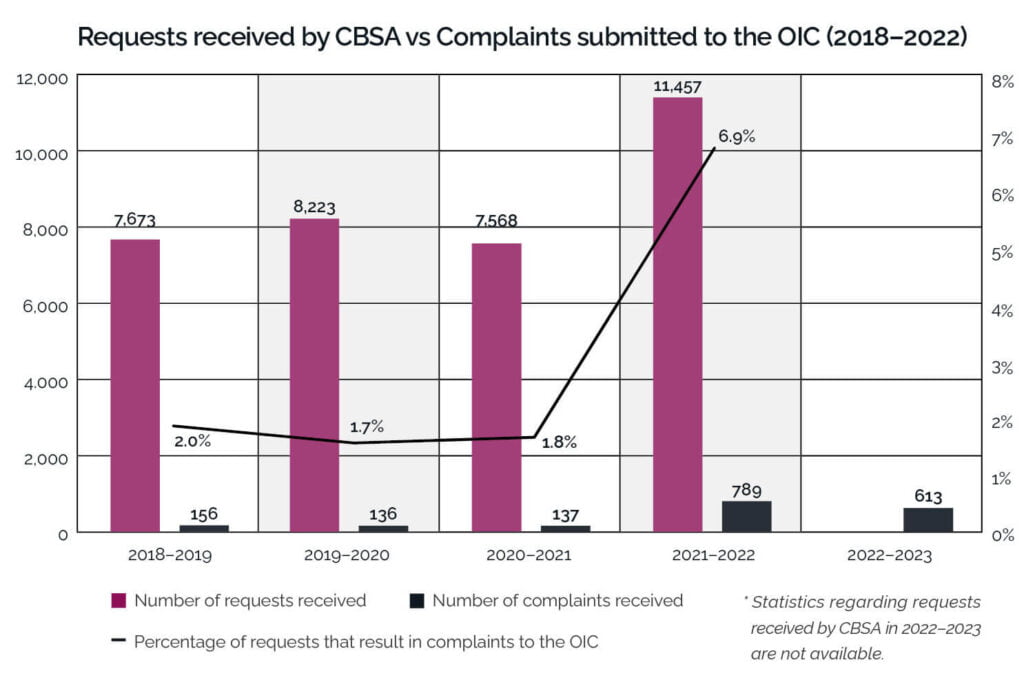Why does it, sometimes, take so long to receive GCMS notes?
Delays with GCMS (Global Case Management System) requests from IRCC are random and in most cases arbitrary. That is why some files arrive on time and some are delayed. The decision by IRCC to delay files is driven by the increase in volume of requests they are receiving. Occasionally delays can happen with CBSA as well. The explanation below does not imply that CBSA is better than IRCC or that CBSA is faster than IRCC all the time. If you are concerned about processing delays then request your file from both IRCC and CBSA.
The facts
The delay is not because your request was not submitted at all, or submitted late or submitted incorrectly. The delay is happening due to the unprecedented demand. With finite resources and an ever-growing demand for GCMS notes, deadlines are not always met by IRCC and CBSA.
If you have any doubts you can always request an official report directly from IRCC / CBSA about your request, it will show you when IRCC / CBSA received the request, when it was due, who was the ATIP officer assigned and what steps were taken to release the file. You can request this report using this link.
The statistics
It’s futile making comparisons with others. The experience of one, few or many does not demonstrate how the process works; for everyone or every time. Instead rely on official data.
Each year IRCC ATIP, for example, publishes an annual report that is submitted to the Canadian parliament which shows its handling of requests. Based on the data from these reports below are the official statistics of how long it takes to process requests.


The figure below indicates that over the last decade, the percentage of requests closed by IRCC within the first 30 days gradually decreased to 25.6% in 2021–22. IRCC has cited “Workload” as the main reason for closing requests past legislated timelines.

Source: Treasury Board of Canada Secretariat.
The legal status
The legislated time-frame for processing a request under the Access to Information Act is 30 calendar days. If additional time is needed to complete the processing a time extension may be taken. However, government institutions are not obligated to notify if there is a delay. When a government institution fails to respond within the time limits, the institution is deemed to have refused access. This situation is commonly referred to as a deemed refusal. In simple terms it means there is an inexplicable delay; it doesn’t mean that your request has been refused.
How long will it take?
From our vantage point an unexplained delay in receiving the file can broadly be classified into two categories [1] an administrative delay which can last from a few days to a few weeks; about 2-3 weeks or [2] a systemic delay in which case the delay is deliberate and by design and lasts longer.
As an example, if there is a systemic delay from IRCC then it is not possible to find out when exactly IRCC will provide the file. IRCC is usually delaying files in increments of about 30-40 days, meaning the delay could be for an additional 30 days or 60 days and so on (from the date when the file was originally due). Keep in mind that not every request made with IRCC gets delayed or follows this pattern, delays from IRCC are random and arbitrary. Also, there is no such thing as an average delay period or maximum delay period. IRCC can take however long it wants! Furthermore, IRCC or CBSA do not follow the first in, first out (FIFO) method of processing requests.
IRCC is known to have used an initiative called “Blitzes“, with a view to reducing processing times. Blitzes are a short‐term solution that allows IRCC to reallocate trained resources from one segment of the workflow to another. These range from “flash blitzes” focusing on one task to “full blitzes”, which focus on all tasks. Blitzes are used to address backlogs and are used sporadically.
What about updates and follow up?
IRCC does not provide interim updates in case of a delay, and neither will IRCC disclose the due date. IRCC no longer responds to inquiries it receives about delays either, even when IRCC did provide a response it was a generic template-based response essentially advising that IRCC is doing its best. Inquiries and follow ups with IRCC have no impact. In short, if there is a systemic delay from IRCC there is nothing that can be done to compel IRCC to provide the file any sooner than it plans to.
On May 1, 2023 IRCC issued a statement regarding GCMS requests stating that it is receiving a large volume of requests and as such, if your inquiry is related to the status of your request, you will not receive a reply. Please note, it is not necessary to send multiple inquiries, as it does not speed up the processing of your request. Your patience is highly appreciated while the responsible team processes your request.
Complaints!
The only formal and legal recourse is to file a complaint with OIC (Office of the Information Commissioner of Canada) but delay related complaints submitted to OIC are usually ineffectual. Also, complaints don’t speed up the processing of a request. OIC does not have the resources to investigate individual delay related complaints and simply waits for IRCC / CBSA to release the file and then it closes the complaint. To demonstrate this fact, below is a copy of an actual letter from OIC informing the complainant that OIC is ceasing to investigate these delay complaints. Despite these issues it is important to know that IRCC / CBSA will provide the file.

The solution.
The only choices are to continue waiting or to make a new request with CBSA if you are waiting on the file from IRCC.
There are a few other things to keep in mind to reduce the risk of delays and avoid disappointment ;
- When submitting the request make sure the information you provide is correct, complete and free of any typographical errors.
- If you are a victim of immigration fraud then your file may not exist.
- Provide all the relevant information the 1st time around, don’t provide information in installments.
- Don’t assume someone else knows what you are looking for, be explicit in what you want. For e.g. if you want your child’s file as well then spell out your child’s full name along with the UCI and application file number.
- Most importantly, pay special attention when it comes to the consent form. Issues with the consent form is the #1 reason for avoidable delays. Don’t sign on behalf of someone 16 or older, sign with your official signature, signature must match that on the govt. id (e.g. passport), don’t paste an image of your signature into the form or use digital tools or software to sign. Print the form and sign directly on the printed form and provide consent for any individual whose information could be contained in the requested file: spouse, sponsor(s), co-signor, any family member including children 16 years of age or older. To allow the release of minor children’s information, provide both biological parents consent. Should a child be under the custody of a single parent or a third party, a valid copy of the custody agreement is required. By providing a well-documented application and consent from all individuals you will have access to more information in response to your request, otherwise, some of the information on file would qualify for exemption.
- Lastly, it is not mandatory but providing a copy of the passport biographical pages (i.e. photo & signature pages) of all applicants will assist the government institution in processing your request; it can be submitted along with the consent form.
Requesting from both IRCC and CBSA and the paradoxical benefit of delays
For most, requesting your file from IRCC will be sufficient. However there can be situations when requesting from CBSA may be a better choice. At the present time, in our view its best to request the same file from both IRCC and CBSA. Requesting from both IRCC and CBSA can strain governments’ limited resources, so use this choice responsibly.
If your visa application was refused then the officers’ refusal comments will be exactly the same whether the file is from IRCC or CBSA. The main purpose of requesting from both IRCC and CBSA is that you receive at least 1 file on time, ideally both but delays happen.
On the other hand if your visa application is in progress you could, paradoxically, benefit if one of your requests from IRCC or CBSA is delayed. The delay may allow you to receive updated information regarding the progress of your visa application.
What are the next steps?
Delays are very disappointing! It’s quite understandable and very frustrating as well. We get it, it’s disappointing that delays happen when you need the information the most only to find out that there is not much that can be done to address it. It’s already long enough that one has to wait the legislated time frame of 30 days only to find out that the request has been delayed and there is no concrete deadline as to when it will be available.
The sooner you accept and come to terms with the fact that delays do happen, the sooner you will be able to consider alternatives. If waiting is not an option consider making a new request with CBSA if you are waiting on the file from IRCC. Keep in mind that delays do happen with CBSA as well and it’s best to request the same file from both IRCC and CBSA.
Systemic investigation of CBSA
The Office of the Information Commissioner has observed a significant increase in complaints being made against CBSA, alleging that CBSA is not responding to requests within legislated time limits. This increase in complaints is having a negative effect on CBSA’s capacity and resulting in a growing backlog.

To better understand the root cause of this surge and provide recommendations, in February 2023, the Information Commissioner initiated a systemic investigation into CBSA’s processing of requests for immigration application files. The Commissioner plans to publish the final report on this investigation in 2024.

